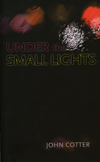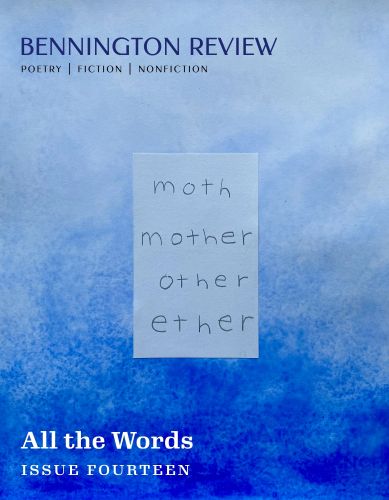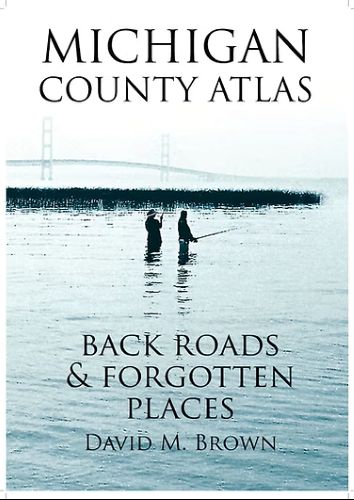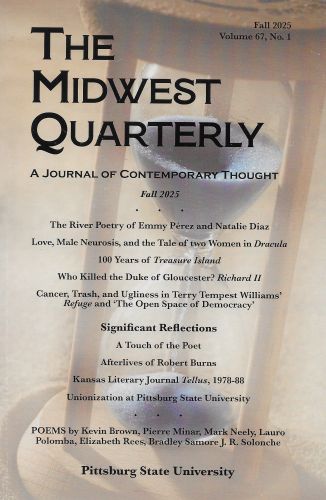John Cotter, author of the just published novella Under the Small Lights, is also a poet. The novella, a co-winner of 2009 Miami University Press Novella Contest, and a knowing yet earnest coming-of-age story about a group of college-age youths embracing a guileless hedonism and salvation through art, has many marks of a poet: a deft feel for spoken language and the ability to create vivid scenes through language. The very structure of the book – with short, often very short, chapters – has less of the expansiveness of prose, and more the concise cognitive breath of poetry.
John Cotter, author of the just published novella Under the Small Lights, is also a poet. The novella, a co-winner of 2009 Miami University Press Novella Contest, and a knowing yet earnest coming-of-age story about a group of college-age youths embracing a guileless hedonism and salvation through art, has many marks of a poet: a deft feel for spoken language and the ability to create vivid scenes through language. The very structure of the book – with short, often very short, chapters – has less of the expansiveness of prose, and more the concise cognitive breath of poetry.
Jack, Paul, and Corinna are best friends who slowly discover themselves to be in a burgeoning love triangle. Jack, the protagonist, introduces Corinna to his best friend Paul, and is disappointed when Paul and Corinna get married and drop out of school. Add to this volatile mix another friend, Star, who likes Jack; and Bill, a profligate young writer who lives in New York City, filtering back stories of his sexual conquests to an admiring Jack. The book is best when it explores the unresolved sexual tension between Jack and Corinna, and his evolving relationship with Paul, as he spends time with the couple in a large New England house owned by Corinna’s parents during the summer of 1996.
One of the strongest aspects of the novella is Cotter’s ease with natural-sounding dialogue, which sparks, shambles, and darts along – the rhythm of you and your friends goofing on each other. As when Jack, Corinna, Paul, Star (and her date for the night) gather in an apartment to watch the Clinton-Dole presidential debate:
“Listen,” I said, “shut up, listen everybody shut up, he’s talking about smoking.”
Star’s date turned. “You be careful who you tell to shut up.” His name sounded like Jock-something. The vowels were not familiar.
Paul liked fights. “I think you should…”
“Just. Everybody, I’m sorry Star,” Corinna said, “but everyone please shut up.”
I was asked a technical question. Are they addictive? Maybe they – they probably are addictive. I don’t know. I’m not a doctor.
“Is he kidding?” Corinna said. “I’m addicted right now. Of course they’re addictive, look at me!”
Cotter’s ability with dialogue often extends to the language of the book in general. Jack and Bill are at Walden Pond with their typewriter for inspiration as they work on their avant-garde play. Jack narrates, “The beautiful combination of drugs we’d swallowed enabled me to feel the snow without the cold. The icy water leading into my boots through the lace-holes felt good. My shell shivered without me.”
The chapters are often very short, usually no more than a handful of pages, and they move in a rough chronology. There is attention to how the main story (Jack, Corinna, Paul) and the minor story (Jack, Bill) are set back and forth between each other – and how they come together late in the book is well-done, though sometimes a new chapter will require some reorientation about where and when things are happening. Chapters do not always transition into new chapters with a lock-step precision. The structure of the book is ultimately rewarding because the short chapters often have the feel of circling back into themselves as memory, making even more poignant the coming-of-age story.
The plot works its way to a summer’s-end party at the house of Corinna’s parents’ neighbor, the famous older poet Charles Jodoin, and his partner David, who both seem modeled superficially at least on James Merrill and David Jackson. Jack, himself a would-be poet, ensures that he is there.
Jack’s twin desires/anxieties are evoked most strongly by Cotter when Jack happens into a room on the second floor at the party where Charles Jodoin is resting and they begin a conversation and people enter: “This was exactly the conversation I wanted to have with Charles Jodoin. I was some young man, but that was just as well. It was as though Corinna slid Paul’s ring off her finger and fell into my arms.”
Jack’s logical slippage here is an impressionistic microcosm of the entire book, told through many moments charged with meaning and yearning, often asking the reader to fill the gaps in the story. But the book also has the substantial advantage of having a great atmospheric beginning, excellent action-packed climax, and a poignant ending. Under the Small Lights is a very good read, and like Sarah Manguso’s memoir Two Kinds of Decay, is definitely worth checking out if you are a poet looking for strategies on how to build a full-length prose narrative.





